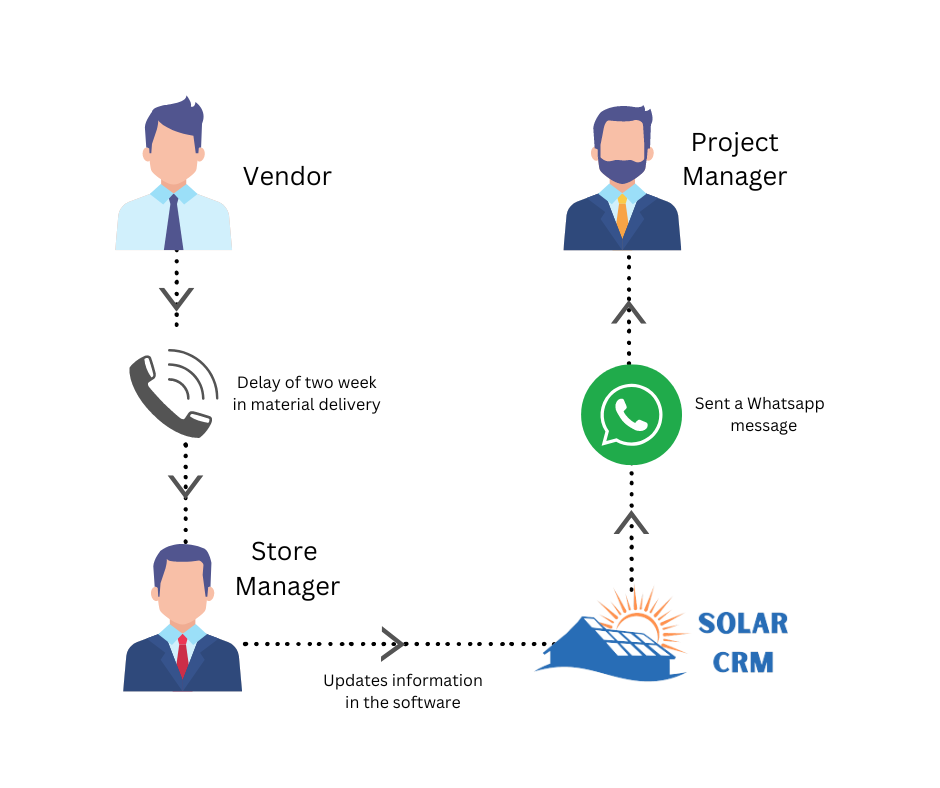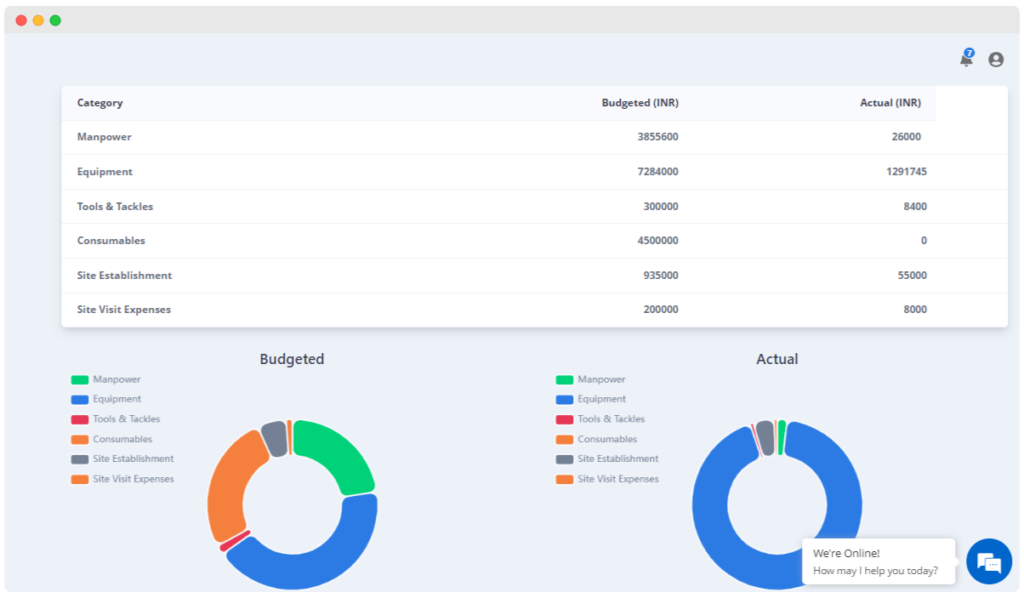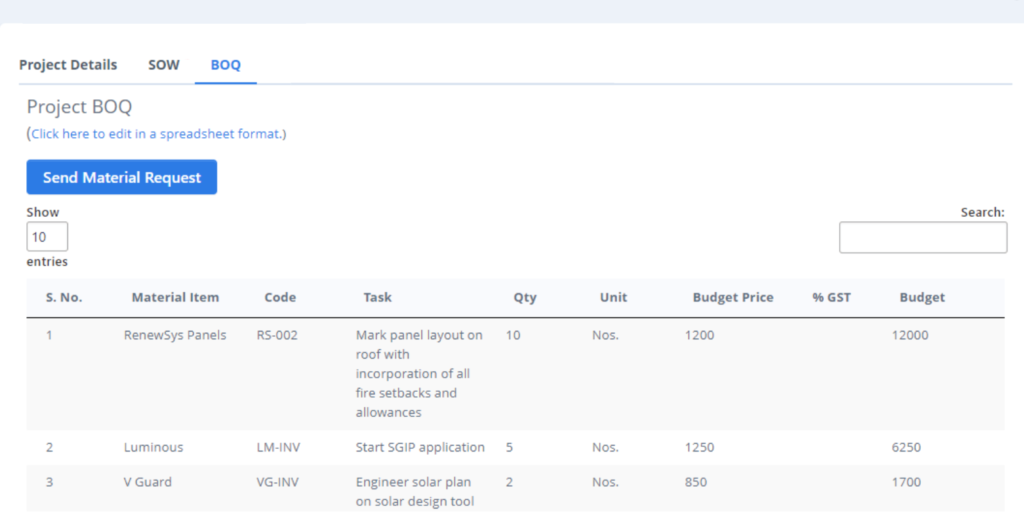Cost control is a critical aspect of managing solar projects successfully. From accurate project cost estimation to maintaining a positive cash flow and efficient inventory management, solar project managers face numerous challenges. However, with the right tools and strategies, these challenges can be overcome, ensuring an effective cost control software for better financial outcomes and project viability.
In this blog post, we will explore the common challenges in solar project cost control and how solar project management software can provide effective solutions. From enhancing cost transparency to optimizing resource allocation, this software plays a pivotal role in streamlining project expenses and achieving profitability.
So let’s dive in.
Common Challenges in Solar Project Cost Control
1. Profitability
When it comes to solar projects, ensuring profitability is a big challenge. Inaccurate cost estimations and inadequate financial planning can lead to budget overruns, putting the project’s profitability and overall financial viability at risk.
To address this challenge effectively, project-wise tracking and estimating are important. By closely monitoring the costs and performance of each project, you can gain valuable insights, and thus identify more profitable projects.
This approach helps you ensure that projects that yield higher ROI receive more attention and allows you to allocate resources accordingly.
For example, you realize that commercial projects require more resources and investment but eventually are generating more profit as compared to other projects.
Would you not pursue them more aggressively? Of course, you would love to but to do so you need accurate data in place.
Additionally, projects with potential profitability concerns can be closely monitored and improved to increase their profitability.
Solution:
Software that
- Tracks project-wise expenses, such as labor, material, and equipment costs.
- Provides real-time visibility into the profit/loss of each project,
- Enables accurate cost tracking thus allocating resources wisely.
With detailed reports and analytics, project managers can make informed decisions, prioritize profitable projects, and ensure long-term financial viability.
2. Cashflow management
Another significant challenge in solar project cost control revolves around maintaining a positive cash flow while avoiding liabilities.
Solar projects often involve substantial upfront investments, ongoing expenses, and long project durations, making it crucial to manage cash flow effectively throughout the project lifecycle.
Moreover, carefully handling payments to suppliers and creditors is essential to avoid unnecessary liabilities and maintain a healthy financial position to prevent cash flow gaps.
Hence, accurate financial forecasting is important to anticipate cash inflows and outflows, ensuring sufficient funds are available when needed.
For example, let’s consider a large-scale solar project that involves multiple suppliers and contractors. Without accurate financial forecasting and diligent payment management, the project may face delays in receiving crucial equipment or services, leading to cost overruns and cash flow shortages.
To do so, thoroughly analyzing individual project costs, tracking expenses, revenue streams, and payment schedules is essential.
However, this can be a challenging task for solar project managers.
Solution:
Software that
- Enables real-time tracking of project expenses, revenue, and cash inflows/outflows
- Provide project managers with a centralized dashboard to monitor cash flow status and identify potential gaps
This will help the project manager take proactive measures to maintain a positive cash flow.
3. Inaccurate project cost estimation
Solar projects involve various costs including equipment costs, labor expenses, permit fees, regulatory compliance costs, and financing charges. Each of these factors can be influenced by external market conditions and internal project dynamics, making accurate cost estimation challenging.
For example, imagine you receive a project to build a residential solar system for a client and you have estimated the cost of solar panels based on the current market prices. However, just before purchasing the panels, there is a sudden surge in demand due to a government incentive program, causing the prices to skyrocket. This will lead to unexpectedly higher expenses, putting strain on your budget and potentially affecting the project cost.
Thus, estimating the total cost of a solar project can be a complex task. When cost estimates are not precise, it can lead to budget shortfalls, financial constraints, and potential delays in project completion.
This can lead to reduced profit margins or no profit at all, thus, indirectly affecting the cash flow system and impacting the outcome of other projects too.
Solution:
Software that provides
- Historical data
- Real-time market insights
This allows the project managers to precisely predict the project cost estimation. Thus, enabling better financial decisions and improved cost control in solar projects.
4. Fluctuating Equipment and Material Costs:
Fluctuation of equipment and material costs is another common challenge in solar project cost management.
The prices of specialized equipment and materials used in solar energy technology can be unpredictable due to market volatility. Factors such as supply and demand, raw material prices, geopolitical influences, and global economic conditions can cause these costs to fluctuate.
These fluctuations make it challenging to accurately estimate project expenses, especially during the early stages of project planning when cost estimates are crucial for budget allocation and financial planning.
Solution:
Software that provides
- Real-time market insights on equipment and material costs
- Historical data to identify trends and patterns in price fluctuations.
Understanding past market behavior can help project managers in predicting future material costs more accurately and thus make more informed decisions.
5. Regulatory Compliance and Permitting Costs:
Complying with regulations and obtaining permits is a significant challenge in solar project cost control.
The solar industry operates within a complex regulatory framework that includes various regulations at local, regional, and national levels. Meeting these regulations is vital to ensure environmental sustainability, public safety, and legal compliance throughout the project lifecycle.
However, obtaining the necessary permits can be time-consuming and expensive.
For example, what if you have all the material available, and everything in place but the permit is not yet granted? This can lead to delay in project execution thus escalating the project costs.
Solution:
Software that
- Streamlines compliance efforts by centralizing relevant data
- Automate documentation processes
This ensures timely adherence to regulations, reducing the risk of expensive delays and penalties.
6. Supply Chain Disruptions
Solar projects rely on a complex network of suppliers to provide equipment, materials, and services. However, supply chain disruptions can arise from various factors like natural disasters, transportation issues, labor disputes, or unexpected supplier unavailability.
When disruptions occur, project managers may face delays in receiving necessary components, leading to project timeline extensions. These delays can have cascading effects on project milestones, causing potential setbacks in the project’s overall schedule.
For example, if a solar project relies on a specific solar panel manufacturer, and that manufacturer experiences a factory shutdown due to a natural disaster, it can lead to a delay in panel delivery. This delay can affect the installation timeline, potentially pushing back the project completion date and increasing associated costs like labor and site management.
To avoid such a scenario the project manager should be informed in advance.

Solution:
Software that
- Connects storage manager and projects managers in one place
- Offers a centralized dashboard for tracking supply chain visibility
This allows the project managers to identify any delays or potential disruptions early to make informed decisions.
7. Inefficient inventory management
Inefficient inventory management poses a significant challenge in solar project cost control. Solar projects require a range of equipment and materials, and managing the inventory of these resources is essential for smooth project execution.
However, ineffective inventory management practices can lead to several issues that impact project efficiency and profitability.
One of the primary problems is excessive stock, where project teams hold more inventory than necessary. This ties up capital and resources that could otherwise be utilized for other critical project aspects.
Excessive stock can lead to increased storage costs, obsolescence, and the risk of damage or spoilage. Thus, disturbing the cost control system.
Furthermore, insufficient inventory can also cause problems. If project teams do not have the necessary equipment and materials readily available, it can result in project delays, increased lead times for reordering, and potential disruptions in project timelines.
Solution:
Software that
- Streamlines supplier interactions,
- Enables optimizing inventory levels to prevent excessive stock and avoid costly delays.
This helps project managers with real-time tracking, and demand forecasting to ensure efficient resource allocation and reduced holding costs, contributing to timely project execution and improved cost control.
Benefits of Solar Project Management Software in Cost Control
Project-wise profit/loss visibility:
Solar project management software provides project managers with clear visibility into project-wise profit and loss data. Real-time cost tracking and reporting enable accurate assessment of expenses against budgets, helping identify profitable projects and areas for cost optimization.

Real-time Cost Tracking and Reporting:
Solar project management software offers real-time cost tracking, allowing project managers to monitor expenses against budgets and take corrective actions promptly. Detailed cost reports and analytics aid in making data-driven decisions to establish a robust cost control system.
Resource Allocation and Scheduling:
The software helps optimize resource allocation, ensuring efficient use of labor, equipment, and materials. Advanced scheduling features facilitate smoother project execution, reducing delays and potential cost overruns.

Enhanced Cost Transparency and Collaboration:
Solar project management software enhances cost transparency by providing stakeholders with clear visibility into project expenses and financial performance. This transparency fosters effective collaboration between project teams, suppliers, and clients, allowing all parties to align their efforts toward cost control objectives. As a result, decision-making becomes more efficient, and potential cost-saving opportunities can be identified and capitalized upon.
Historical cost tracking data
The software maintains historical cost-tracking data, allowing project managers to analyze past project expenses and trends. This historical data can provide valuable insights for future project cost estimation and planning, helping improve the accuracy of future budgets.
Integration with project management, material management, and CRM modules
Solar project management software offers seamless integration with essential modules, including project management, material management, and customer relationship management (CRM). This integration streamlines the flow of data, eliminating the need for data entry, thus making it a user-friendly solution. By incorporating ongoing project activities, material management, and client billing data in one place, this cost control software becomes an indispensable tool.
Conclusion:
Solar projects present unique cost management challenges, but with the help of advanced technology like solar project management software, these obstacles can be tackled efficiently. From real-time cost tracking and reporting to seamless integration with various modules, this cost control software empowers project managers with the tools required a create a robust cost control system.
By proactively addressing challenges like inaccurate cost estimation, cash flow management, and supply chain disruptions, solar project teams can ensure successful and financially sound projects.
